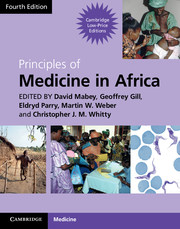Book contents
- Frontmatter
- Contents
- Contributors
- Foreword
- Section 1 Health and disease
- Section 2 Mother and child health
- Section 3 Infection: general principles
- Section 4 Major common infections
- Section 5 Bacterial infections
- Section 6 Viral Infections
- 34 Viral haemorrhagic fevers: yellow fever, Lassa fever, Rift Valley fever, Ebola/Marburg fever and Crimean–Congo fever
- 35 Dengue
- 36 Rabies
- 37 Influenza
- 38 Poliomyelitis
- 39 Varicella (chickenpox), herpes zoster and monkeypox
- 40 Rubella
- 41 Mumps
- Section 7 Protozoal infections
- Section 8 Helminth infections
- Section 9 Fungal infections
- Section 10 Non-communicable diseases
- Section 11 Diseases of body systems
- Section 12 Cancer and Palliative Care
- Section 13 Venoms and Poisons
- Index
- References
41 - Mumps
from Section 6 - Viral Infections
Published online by Cambridge University Press: 05 March 2013
- Frontmatter
- Contents
- Contributors
- Foreword
- Section 1 Health and disease
- Section 2 Mother and child health
- Section 3 Infection: general principles
- Section 4 Major common infections
- Section 5 Bacterial infections
- Section 6 Viral Infections
- 34 Viral haemorrhagic fevers: yellow fever, Lassa fever, Rift Valley fever, Ebola/Marburg fever and Crimean–Congo fever
- 35 Dengue
- 36 Rabies
- 37 Influenza
- 38 Poliomyelitis
- 39 Varicella (chickenpox), herpes zoster and monkeypox
- 40 Rubella
- 41 Mumps
- Section 7 Protozoal infections
- Section 8 Helminth infections
- Section 9 Fungal infections
- Section 10 Non-communicable diseases
- Section 11 Diseases of body systems
- Section 12 Cancer and Palliative Care
- Section 13 Venoms and Poisons
- Index
- References
Summary
Mumps is a common and generally mild viral infection of children. In unvaccinated populations, which include the whole of sub-Saharan Africa, it is one of the main causes of sensorineural deafness and encephalitis. Adults classically present with parotid swelling and up to a quarter of infected men experience orchitis. The MMR vaccine is safe and effective but may lead to an upward shift in the age and severity of presentation if introduced into national immunization programmes without high levels of cover.
Biology
Mumps is caused by a paramyxovirus, a close relative of parainfluenza. It was first recognized by Hippocrates in the fifth century BC when he described an ‘outbreak of swelling about the eyes [where] inflammation seized sometimes one of the testicles’. It is an RNA virus with one distinct serotype and several genetic subtypes. The capsid surface is made up of haemagglutinin-neuraminidase and fusion proteins, which are responsible for cell adhesion and entry.
Epidemiology
Mumps is spread by respiratory droplets and direct contact with contaminated material. It has an incubation period of 16–18 days (range 2–4 weeks) and patients are contagious from 2 days before to 9 days after the onset of parotid swelling.
- Type
- Chapter
- Information
- Principles of Medicine in Africa , pp. 398 - 399Publisher: Cambridge University PressPrint publication year: 2013



